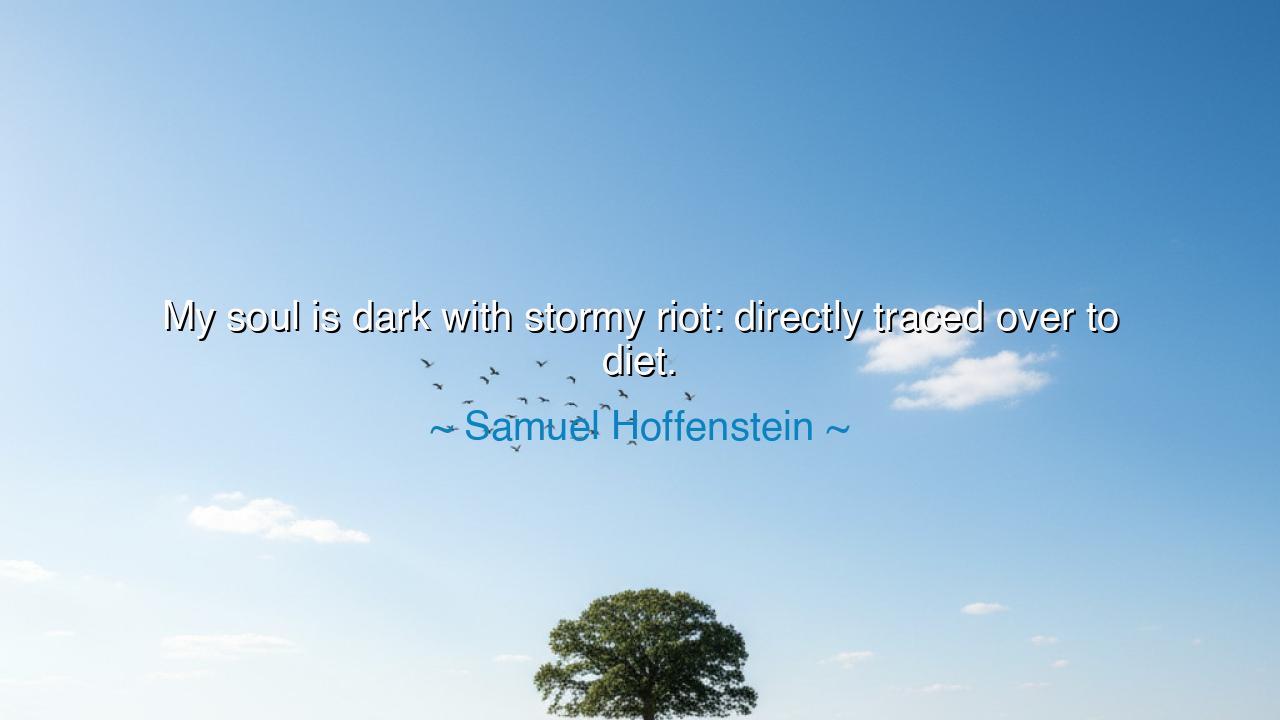
My soul is dark with stormy riot: directly traced over to diet.






When Samuel Hoffenstein wrote, “My soul is dark with stormy riot: directly traced over to diet,” he clothed a truth both humorous and profound in the cloak of poetry. Behind the wit lies an ancient lesson: that the state of the body and the state of the soul are forever intertwined. His words remind us that the storms that rage within us — our irritability, our melancholy, our lack of peace — are often born not from the heavens, but from the very things we choose to place upon our tables. What we eat, he suggests, does not merely fill the stomach; it stirs the spirit, colors the mood, and shapes the temperament of the soul itself.
In Hoffenstein’s words, there is irony, but also wisdom — a knowing smile at humanity’s tendency to separate the physical from the spiritual, when in truth they are bound together as tightly as the earth and its shadow. The poet, perhaps, was reflecting upon his own experience: how a poor meal, a night of gluttony, or the neglect of health could turn the heart restless and the mind dark. And yet, he does not scold; he merely observes with humor what philosophers have declared with gravity — that a disordered body breeds a disordered mind. His jest echoes the wisdom of the ancients: that temperance is not only a virtue of morality, but a cornerstone of clarity and joy.
The ancients themselves knew well this connection. The philosopher Pythagoras taught his disciples to eat with simplicity and restraint, believing that the foods one consumed carried an influence upon the soul’s purity. Socrates urged moderation, claiming that a man ruled by appetite could never rule himself. The physicians of old, from Hippocrates to Galen, wrote that diet and mood were not separate domains, but branches of the same tree — that one’s humors, passions, and even thoughts were shaped by what one ate. Thus, Hoffenstein’s poetic jest, though born in a modern age, is the echo of an ancient chorus: that the harmony of the spirit begins with the harmony of the body.
There is a tale told of the Emperor Marcus Aurelius, the philosopher-king, who during a period of war and hardship found himself beset by irritability and despair. He sought counsel not from generals or priests, but from a physician who advised him to fast and purify his diet. The emperor obeyed, and in the quiet simplicity of that discipline, his mind grew clear, his judgment steady, his heart calm. From that experience, he wrote in his Meditations that “the soul becomes dyed with the color of its thoughts,” yet those thoughts, too, are shaped by the vessel in which the soul resides — the body. In this story lies the truth Hoffenstein wove in jest: when our diets are ruled by chaos, our inner lives cannot escape the stormy riot that follows.
But Hoffenstein’s line also speaks beyond food — it is a mirror to the modern human condition, where indulgence is praised and restraint forgotten. We feed not only the body with excess, but the mind with noise, the spirit with distraction, and then wonder why peace eludes us. His “stormy riot” is the turbulence of a world overfed and undernourished — a world where plenty has become poison, and abundance, anxiety. The poet’s wry confession invites us to pause and look inward: are our storms self-made? Are we, through neglect of discipline, the architects of our own unrest?
His choice of words — “dark,” “stormy,” “riot” — calls forth an image not of stillness, but of turmoil, suggesting that imbalance in the smallest of things can lead to great disturbance within. The lesson is not one of shame, but of awareness. To eat wisely, to live moderately, to care for the body with reverence, is not vanity — it is the foundation of serenity. The one who eats with mindfulness feeds both body and soul; the one who devours thoughtlessly feeds neither. The poet’s humor thus becomes a gentle warning: take care what you consume, for every choice of appetite becomes a whisper in the chambers of your spirit.
So, my listener, learn from Hoffenstein’s playful lament. Guard your diet not only for health, but for harmony. Let what you eat be simple, natural, and life-giving. Drink water as the ancients drank from springs; eat fruits that remember the sun; avoid what clouds the mind and dulls the heart. But beyond food, watch what you feed your thoughts, your eyes, your soul. For every indulgence that seems sweet may yet sow unrest, and every act of temperance may bring peace.
Remember this eternal truth: the body is the garden of the soul, and if we sow it with care, we shall reap joy. As Hoffenstein wrote in jest, so the wise have spoken in earnest — the storms of the spirit are often born from the table. Choose well, live simply, and the riot within will quiet into calm — and your soul, once dark, will shine again in balance and in light.






AAdministratorAdministrator
Welcome, honored guests. Please leave a comment, we will respond soon